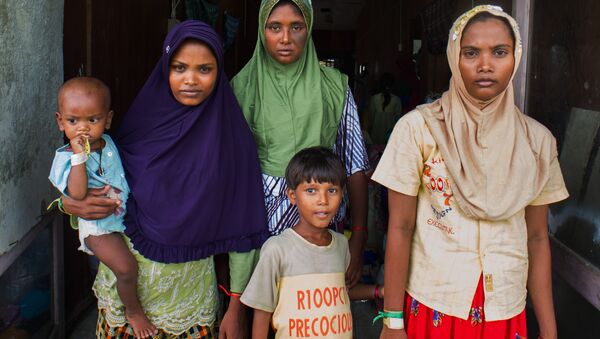The investigation indicates Burmese army and Border Guard Police personnel took part in rape, gang rape, invasive body searches, and sexual assaults in at least nine villages in Burma's Maungdaw district between October 9 and mid-December.
Survivors and witnesses identified army and border police units by their uniforms, kerchiefs, armbands, and patches, and described forces carrying out attacks in groups, some holding women down or threatening them at gunpoint while others raped them. Many survivors reported being insulted and threatened on an ethnic or religious basis throughout the assaults.
On the spot in front of me, 4 military raped my 16-year-old daughter Violence against #Rohingya women & girls https://t.co/RdlYxoTuNM #Burma pic.twitter.com/pKxqVVKCXc
— Phil Robertson (@Reaproy) February 7, 2017
HRW said the attacks added a new and brutal chapter to the Burmese military's "long and sickening" history of sexual violence against women. Phil Robertson, deputy director of Human Rights Watch Asia noted discrimination towards the Rohingya people is centuries-old in Burma, and gained state sanction in 1982, when the Citizenship Act did not define the people as a recognized ethnic race — despite the Rohinghyas residing in the country for centuries. As of 2016, around two million currently live there, primarily in Rakhine State. Nonetheless, many Burmese view them as "foreigners," Mr. Robertson says, "which is ridiculous."
"This wave of violence was spurred by attacks by Rohingya militants on border police posts in October 2016. In response, the Burmese military undertook a series of "security clearance operations," executing men, women, and children and burning down over 1,500 homes and buildings in pursuit of the insurgents. While widely condemned, the Tatmadaw responded by cutting off these areas, essentially throwing a security blanket over them, and then engaging in scorched earth tactics against the enclosed villagers — looting and pillaging, raping and killing people," Mr. Robertson told Sputnik.
The attacks have been strenuously denied by the Burmese government, with official statements claiming the accusations were "fake," despite some attacks being documented on video.
#ASEAN leaders "backscratching" to ignore human rights abuses on full display in #Cambodia & #Myanmar mtg says @hrw https://t.co/zAoRk3k002 pic.twitter.com/HZKcQvacbe
— Phil Robertson (@Reaproy) February 7, 2017
UN Human Rights Special Rapporteur Yanghee Lee has strongly criticized the government's defensive reaction, and said the government's credibility on the issue was rapidly eroding. Nonetheless, Mr. Robertson says the government has continued to block humanitarian aid to the Rohingyas in many of the affected areas, "only slowly allowing" food and other fundamental supplies to be delivered.
"Around 69,000 Rohingyas has fled to Bangladesh, but they're not treated that well there either — the UN has considered the Rohingya one of the most persecuted minority people on earth. There are currently over 200,000 without status, based in a makeshift refugee camp in Cox's Bazaar. This is in addition to around 30,000 Rohingya refugees who have been based there since 1992. We're pushing hard in North America, Europe and with the member states of the Organization of Islamic Cooperation to get agreement from the UN Human Rights Council to establish an independent, international investigation into the events in Northern Rakhine State," Mr. Robertson added.
#Myanmar, 'The existing Commission is not a credible option to undertake the new investigation' UN Adama Dieng — https://t.co/WV3D3W4i60
— Lorenzo Urbinati (@LorUrb) February 7, 2017
The Human Rights Watch findings follow a February 3 United Nations report that detailed "devastating cruelty" against Rohingya people, including women (half of which have been subject to rape or other kinds of sexual violence), children, the elderly and the disabled.


